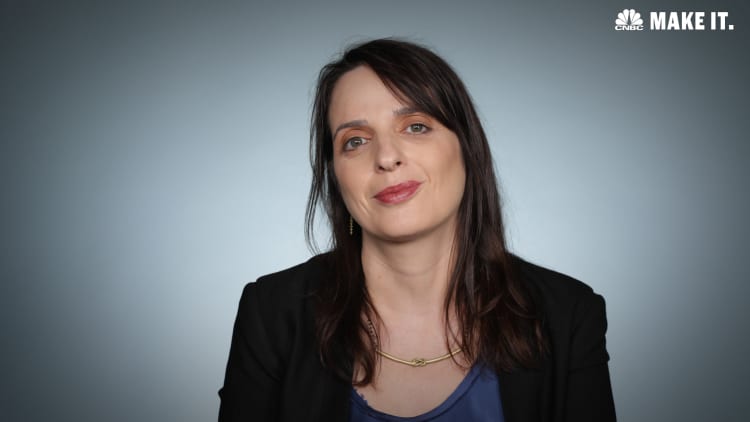Roughly 12 years after finishing his degree, Dietrich Knauth has, at last, paid for it. In the days leading up to turning 34 last month, he paid off the last of his almost $117,000 in student loans.
Finally polishing off those loans felt like a birthday gift to himself, he says: "It is incredibly freeing to think about moving forward without this weight around my neck."
This was the year he was determined to get it done, so he paid roughly $16,000 toward his debt in 2018 alone, picking up freelancing gigs to bring in extra money in addition to working his day job as a financial reporter.
The standard repayment plan for federal student loans assumes borrowers will be done in 10 years, but 60 percent of those with student loans expect to pay off their loans in their 40s, according to a survey from Citizens Financial Group. So Knauth is ahead of many of his peers.
Here's how he made it happen.
Where he started
To get his bachelor's degree in journalism from New York University, Knauth took out just over $87,000 in student loans, more than twice the national average. Then, over the next 12 years, he paid over $28,000 in interest, plus a bit extra in late fees and other adjustments, for a total of nearly $117,000.
Knauth, who has 10 siblings, always knew paying for college was his responsibility. When he was accepted to NYU with a scholarship, going seemed like a no-brainer. But his scholarship didn't cover everything, especially since Knauth lived in expensive, on-campus dorms for his first two years.
His family never really talked about money growing up and Knauth says there wasn't a lot of guidance on what to expect and how much you should take out in loans.
The debt began to pile up, and his parents didn't want to continue to co-sign for additional loans. That forced Knauth to take time off to work for a semester so he could afford to go back. Eventually, two of his older siblings agreed to co-sign loans so he could finish his degree.
The experience taught him a lot of valuable lessons. This biggest? "Be honest about what you're willing to give up if you go to a fancy college," Knauth says.
Be honest about what you're willing to give up if you go to a fancy college.Dietrich KnauthNYU alum
"People ask why I didn't get an unpaid internship while in school — because I was working part time and doing class work," he says. "It made me sick to think of taking academic credit for an internship: 'You mean, I'm taking out loans to pay tuition costs for work that I'm doing for free?'"
His loans also made him very cautious about his career opportunities. "I could not gamble on a better gig because I couldn't afford for it not to work out," Knauth says.
Instead of seeking out low-paying or exciting but unreliable positions at outlets he liked, he worked as a reporter for stable trade publications, recapping legal decisions, regulations, government reports, and business press releases.
It was "boring and unglamorous," he says, but employers were willing to pay him a fairly steady salary.
He made mistakes along the way
Throughout his career, he says, "I let my loans define me." Because he was in the red, he was always "hustling" after easy money, to the point he felt like a "craven mercenary."
And taking out a whopping $87,000 in student loans may not have been necessary in the first place. Looking back, he says that he could have saved more and borrowed less. For example, he says, he should have rented a cheap apartment off-campus from the beginning instead of living in pricey student housing for two years.
He also wishes he hadn't used loans to pay for some of his study abroad experience in London.
The mistake that probably ended up costing the most was consolidating. Initially his loans were through CitiBank and SallieMae. Over the years, the Citibank loans were sold to Discover, and the SallieMae loans were sold to Navient. To make it simpler, he consolidated his federal loans through SallieMae, locking in about $20,000 in loans at interest rates near 8 percent just before the financial crisis.
Had he left things alone, all of the variable interest rates would have dropped, and he would have saved money in the long run.
There were times when I ate peanut butter and jelly sandwiches until I ran out of peanut butter, and then I just ate jelly sandwiches.Dietrich KnauthNYU alum
How he paid off the debt
Getting to the end of his loans took hard work and sacrifice, Knauth says. He kept his monthly expenses low: He spends just over $2,000 a month on rent, bills and food — almost the same amount he was spending when he first moved to New York.
Budgeting and carefully tracking expenses is crucial, he says. "If you go over-budget, don't give yourself a pass. Try instead to challenge yourself to make up the shortfall where you can."
For him, that usually meant buying fewer lunches and drinks. "There were times when I ate peanut butter and jelly sandwiches until I ran out of peanut butter, and then I just ate jelly sandwiches."
Side gigs also helped. In addition to working as a financial reporter, Knauth picked up two freelance jobs this year to pull in extra cash. When it comes to finding jobs that pay, he says, find the intersection of "what people will pay for" and "what is bearable."

His single-mindedness this year, though, came at a cost. Knauth blew through most of his emergency savings. Typically, he keeps about three months' worth of expenses, roughly $7,000, but in order to fully pay off the debt at last, he wiped out everything except $2,000.
"It's a gamble, but I'm comfortable with it," he says, since his job is fairly stable and his remaining savings can float him for a month, if necessary.
What happens now
With his loans wiped out, Knauth says he's left wondering what he can do with that "extra" $16,000 that went to loans this year. Meanwhile, he's enjoying the freedom, which allows him to be more creative.
"I'd never have been able to concentrate on" the novel he's writing, he says, if his student loans were still hanging over his head.
In August, Knauth started a new job and got a decent raise. The extra money allowed him to quit the side gigs.
"It's doubly freeing, because I'm making almost the same amount of money without having to hustle on the side," he says, "and I no longer have the monthly loan payments dragging me down."
Don't miss: Don't make this common student loan mistake that can cost you thousands of dollars
Like this story? Subscribe to CNBC Make It on YouTube!



